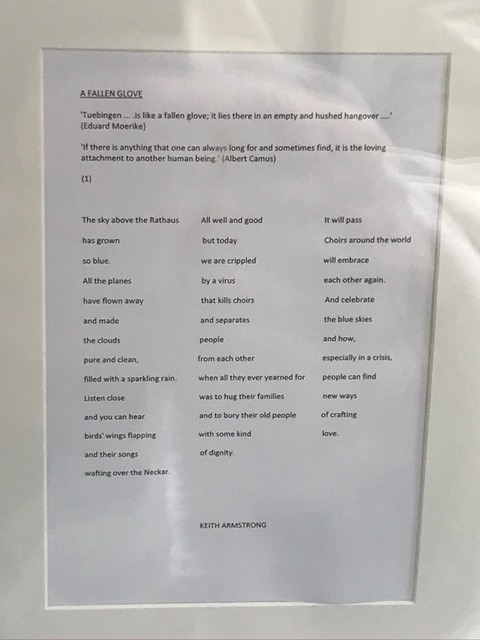TUEBINGEN LOCKDOWN EXHIBITION - POETRY BY KEITH ARMSTRONG; PHOTOS BY ULRICH METZ
The idea of capturing the effects of the pandemic in a long-term series of pictures came up after the first lockdown had turned Tübingen into a "ghost town".
At least that was my impression when I was out and about in the deserted city center at lunchtime. Well-known alleys and squares, everyday life, cultural events etc. looked different - and were suddenly new to me in photography.
In mid-March I had already started to document the changes in my environment with an analog camera and b / w film, and later with a monochrome digital camera. The photo of the women in my "Kiez" was one of the first pictures in the series. The friends made the most of the unfamiliar situation and met while observing the rules of distance. Nobody could have imagined that it would ever come to that.
In the spring, I was in close email contact with Dr. Keith Armstrong, a poet from our English twin town Durham. From there, too, news came about this life in special times. Armstrong was quickly convinced of the exhibition idea and contributed his impressions to my pictures in the form of poems.
Since we are currently in a lockdown again, I will probably still not run out of motives. Unfortunately.
Ulrich Metz
A FALLEN GLOVE
'Tuebingen ... .is like a fallen glove; it lies there in an empty and hushed hangover ....' (Eduard Moerike}
'If there is anything that one can always long for and sometimes find, it is the loving attachment to another human being.’ (Albert Camus)
(1)
The sky above the Rathaus
has grown
so blue.
All the planes
have flown away
and made
the clouds
pure and clean,
filled with a sparkling rain.
Listen close
and you can hear
birds' wings flapping
and their songs
wafting over the Neckar.
All well and good
but today
we are crippled
by a virus
that kills choirs
and separates
people
from each other
when all they ever yearned for
was to hug their families
and to bury their old people
with some kind
of dignity.
It will pass.
Choirs around the world
will embrace
each other again.
And celebrate
the blue skies
and how,
especially in a crisis,
people can find
new ways
of crafting
love.
KEITH ARMSTRONG
(2)
Hundreds of miles
away,
I am touching
trees
on the Platanenallee.
I am expressing
solidarity
behind my mask.
I am bridging,
with my imagination,
social distancing
so that I can enjoy
feeling the breath from the river
whispering joy
through Tuebingen's branches
and briefly kissing away
the curse of dreams
dying.
KEITH ARMSTRONG
(3)
BOULANGER LOCKDOWN
The bar
has fallen
silent,
shut down
by a quirk
of nature,
closed
out of fear.
I remember
the noise
of people ranting
in the vibrant night,
the clatter
of their tongues,
and beer glasses
echoing
in my dreams.
Now
the tables are covered
in a virus shroud.
We cannot touch
the surface of the wood,
we cannot even smile.
But, from Durham,
I send laughter
to the old and young,
the lonely.
I email hope
to the suffering.
My old friend,
I will not forget
the poems you made:
they will live on
in the beauty
of your grandchildren.
KEITH ARMSTRONG
(4)
THE BUSKER
This busker
plays a song
drunk with grief.
It seems that
all life's sadness
is gathered
in his loner's voice
that flutters
and stutters
across the street
in this closed-down town;
this cul de sac
soaked
in wasted wine
and bitter memories
of better days.
KEITH ARMSTRONG
(5)
PANDEMIC WEDDING
This is a marriage of loneliness,
of inconvenience,
of social distance;
a separation
united in a strong affection,
a love of life
that transcends
a lockdown,
overcomes
the fear of touching.
KEITH ARMSTRONG
(6)
The next time
I stride
through the door
of the Cafe Piccolo,
I will not wear
a face mask,
I will not be scared
to open up my heart.
I will take a beer
in my lips
and swallow
the sunshine of it,
cracking open
a new joke
to share with Michele
and next year's
spring flowers.
KEITH ARMSTRONG
(7)
ON CORONASTRASSE
On Coronastrasse,
there are lovers unable to touch one another,
children cut off from the old,
vicars who cannot pray in their own churches.
On Coronastrasse,
there are working girls who cannot find work,
footballers with no games to play in,
libraries with no books to borrow from.
On Coronastrasse,
there are hotels with no rooms to stay in,
buses and trains without any passengers,
seminar rooms emptied of seminars.
On Coronastrasse,
there will be sunshine again,
wine and song to fill the days and nights
and futures to dance in.
KEITH ARMSTRONG






















